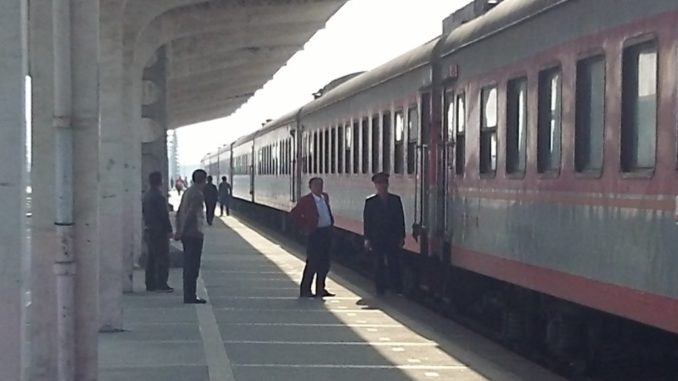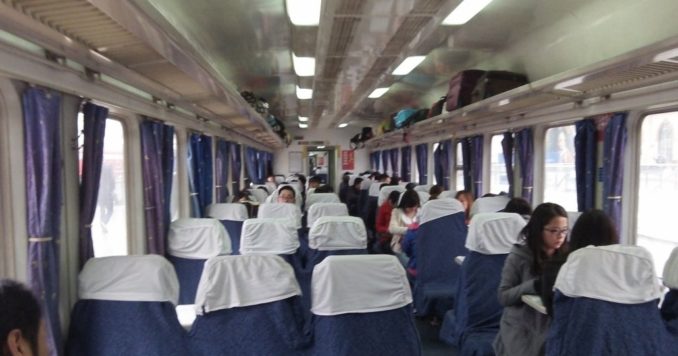
In spring 2013, I travelled by train across China from Guangzhou to Qingdao in the north via Wuhan. This leg starts at Shijiazhuang, where I discovered the hard way why most Chinese plan their journeys well in advance.
I had reached Shijiazhuang in the central northern province of Hebei, and now had to change trains. But there were no services to Qingdao until the small hours, ten hours away. I needed alternative options, but the information counter were useless. Timetable and route information was only accessible through the ticketing machines, they said, for which you needed to insert a Chinese ID card. Stumped.
I was eventually helped out by two kindly youths, who, to my shame, I had initially suspected of trying to scam me. Using their own ID cards, they accessed the timetable info in a ticket machine and showed me a possibility that the counter girl had not mentioned, taking the next train to Dezhou and changing there for Qingdao.
Where the hell was Dezhou? I went back to the information booth to get more detail.
“Excuse me, do you have a railway map of this region? With Dezhou on it?”
After repeatedly being misinformed on this journey, I wanted to see myself where the lines went, and what options existed.
“No. You need to go to the bookshop over there to get a map.”
“How come an information booth at one of China’s major railway junctions does not have a local network map?”
“You need the bookshop. Over there.”
I tried a new tack.
“OK. Now I’m thinking of taking the next Dezhou train to connect with the Qingdao train this evening. Could you tell me what time the Qingdao train leaves Dezhou?”
“We don’t have that sort of information.”
“You’re an information counter and you don’t have information about connections?”
“No.”
For a moment, I was tempted to ask them what the time was, to see if they replied, sorry, we don’t use clocks at Shijiazhuang station. Instead, cursing loudly in English, I stormed off to the bookshop, where they told me they did not have any railway maps.
Then I went for a walk in the enormous station square, flanked on the right by knackered 1980s apartment blocks and on the left by a building site. The station building was another concrete monolith, large enough to house a fleet of 747s. Then I thought, fuck it, I don’t care where the train goes, as long as it gets me out of this place. I bought a ticket to Dezhou.
The train to Dezhou was nearly an hour late. This, I figured, probably meant I was going to miss the Qingdao connection, if indeed there was one, but, because I had no Chinese ID and so could not use the ticket machines, I could not check. I stood and fumed.
A railway policeman came up to me and explained politely that the train to Dezhou was delayed by one hour.
“Wo zhidao. I know.”
“Ah, you speak Chinese?”
“Why is the train delayed?”
“Why?”
“Yes, why?”
“Because it’s a long-distance train.”
“Because it’s a long-distance train?”
He gave me a subtly condescending, don’t-you-know-anything-about-China look.
“Ordinary-class long-distance trains in China are generally subject to delays.” He spoke diplomatically and smiled apologetically; no further explanation was needed. He added: “Ni jiang zhongguohua jiangde hen hao — You speak very good Chinese.”
I thanked him politely. People didn’t say that to foreigners who are really good at Mandarin. They said it to beginners.
But he looked out for me when the displays went wrong, correcting the errors. What can it be like, I wondered, trying to be beacon of bureaucratic rectitude in a country like this? While kicking my heels, I tried to enjoy the architecture. The theme at Shijiazhuang station hall was massive striding arches. It was like looking up at the bottom of a great river bridge.
The late train turned out to be the Guangzhou-Tianjin sleeper, and it was so packed, people were slumped in the corridors. I stood by a window. We trundled out of Shijiazhuang, a city I had barely heard of, with a name I could hardly pronounce; looking at a tourist brochure, I was amazed to read it had ten million inhabitants, and was bigger than Berlin.
After the bullet train, the sleeper seemed agonisingly slow, taking hours to cover the short stretch of industrial east Hebei to Dezhou. The conductor provided some light relief, cracking jokes that got proper laughs, though they all went over my head, and referring to the passengers ironically as “comrades” (tongzhimen), the first time in many years I could recall hearing this politicised word used in everyday life.

It was a dismal stretch of line, through a dusty plain dotted with chemical plants, small coal mines and cooling towers. Despite the discouraging environment, residential blocks were going up in thickets.
Dezhou, just over the Shandong border, had a huge coal-yard and a general air of being stuck in 1985. The station looked even older than that. From the coach, you jumped down over one foot — enough to risk knee damage if you were old, infirm or encumbered — to a platform of concrete tiles surfaced like a miniature Giant’s Causeway. People stopped in their tracks to gawk at me when I emerged from the exit tunnel, the first European ever to set foot in their town.
With dusk coming on, I made first for the unlit ticket shed outside to pick up the next piece of bad news about my itinerary, for I was fairly confident now I had missed the Qingdao connection. It had no timetables on display, and the route map — the first I had seen all day — was so high off the ground that it was illegible.
In this gloomy lair, a queue of people who might have filed out of a Lowry painting inched towards a mounted glass booth in which sat the ticket clerk. She was young, and in another context — a cosplay party perhaps — might even have been attractive, but here she sat like a Davros at its console, stripped of all femininity. I have been to places poorer than China, but none where girls can seem so neutered by their jobs.
In a grossly over-amplified voice, she barked out a four-line litany over and over: “Nali? Mei you. Mingtian you. Yaobuyao?” (Where you going? No (tickets) left. There’s some for tomorrow. Well? Make your mind up!). She hardly paused for breath between each customer.
The elation of the earlier bullet train ride was a distant memory now. This was China as I had known it three decades before. This was the squalid, vile-tempered, hopelessly backward China I thought did not exist anymore, where the paying punter was just a nuisance to be got rid of as quickly as possible, as it made no difference to your wage packet. The only difference today was a few mounted screens. When I got to her, after 30 minutes, she confirmed that I had indeed missed the Qingdao train and would have to wait till two in the morning for the next one.
“Suanle,” I said. Forget it.
“You say you’re heading from Wuhan to Qingdao?”
“Yes.”
“You realise you shouldn’t be on this line at all? You should have gone via Zhengzhou, not Shijiazhuang. That’s where the best connections are. Zhengzhou.”
I had been misinformed again. As I coldly thanked her, I thought I caught the ghost of a smile on her face. I had brought a little joy to her day.
So, I was stuck in this dump for the night. Stepping outside, I reached into my rucksack and fished out my Traveller’s Emergency Hand-Grenade. I unpinned it and lobbed it though the door of the shed, which exploded and collapsed in a pile of brick rubble. A few bewildered survivors staggered out, silently brushing themselves down. A few moments later, I heard a robotic voice calling out:
“Where to? Nothing left. There’s some for tomorrow. Well? Make your mind up!” ..
Actually, the grenade was an orange. [To be continued]
Taken from my free travel book about China, Shenzhou, a copy of which can be read or downloaded at this website: https://www.itabibito.com/ (scroll down to the middle of the page)
© text & images Joe Slater 2020
The Goodnight Vienna Audio file
Audio Player
unshaven girls займ на карту мгновенно круглосуточнозайм срочно без отказов и проверокзайм под материнский капитал займ на карту маэстро онлайнзайм удобные деньгионлайн займ на карту круглосуточно



